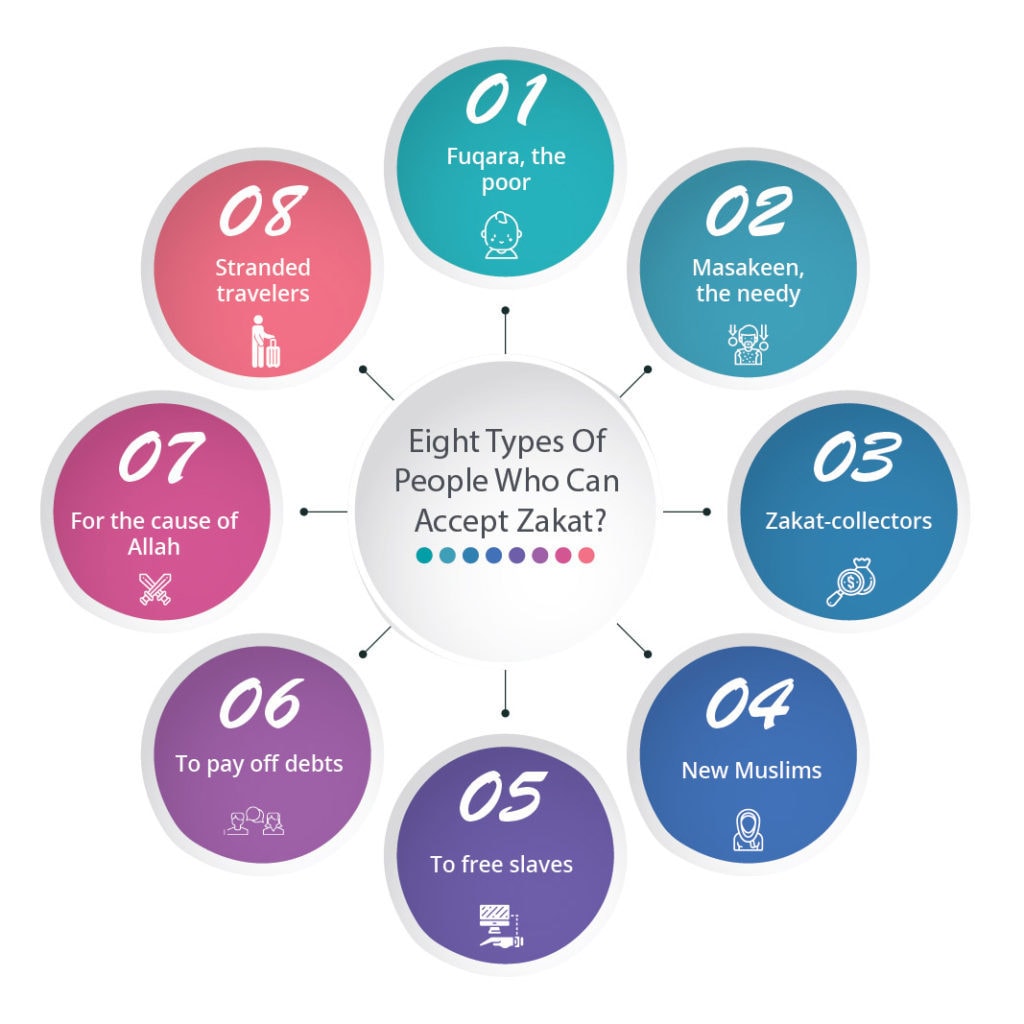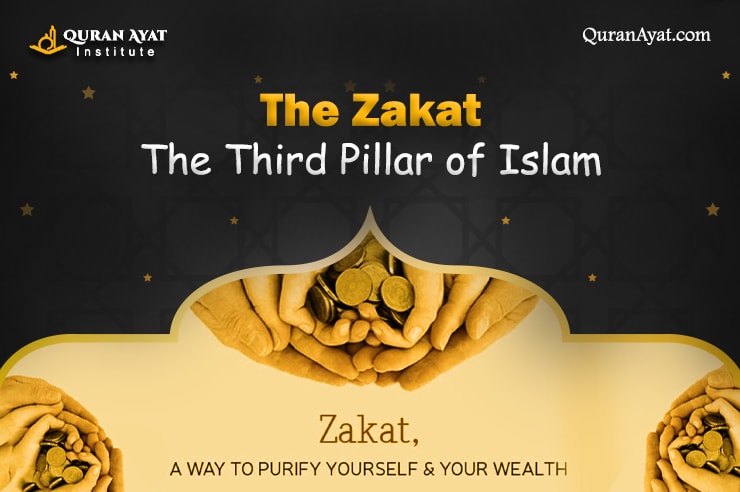One of the 5 pillars of Islam is Zakat which represents an obligatory charity upon all Muslims. Unlike traditional donations to charity organizations, Zakah is a regular payment/give away according to certain terms & calculation.
In this article, we’ll get to know about the third pillar of Islam, its importance, types of Zakat, and how to calculate it.
What is The Third Pillar of Islam?
“Zakat” or “Zakah” comes from the Arabic word “زَكاة/زكاه” which linguistically means “Purification” or “Growth”. Zakat is the third pillar of Islam and a great method to ease the suffering of millions of people through a sustainable charitable effort.
Zakat does not refer to charitable gifts given out of kindness or generosity. According to Islam, every capable Muslim has to deduct a certain amount every year of his/her income to support the Muslims in need, and it usually about 2.5% of an individual’s net income after fulfilling obligations and family expenses.
This unique pillar highlights the beauty of Islam as a religion of peace, mercy, and justice. Islam encourages the sharing of wealth with other Muslims who are needy and poor.
Zakat has so much significance for all Muslims, that’s why Allah (SWT) combined it with prayer (salah) in many verses in the Quran. By making it a pillar, Allah Almighty makes almost everyone experience it either as a giver or as a receiver.
Moreover, There are five principles that should be followed when giving the Zakāt:
- The giver must declare to Allah (SWT) his intention to give the Zakāt.
- The Zakāt must be paid on the day that it is due.
- After the offering, the payer must not exaggerate on spending his money more than usual means.
- The payment must be suitable for the current financial situation. This means if one is wealthy then he or she needs to pay a portion of their income. If a person does not have much money, then they should compensate for it in different ways, such as good deeds and good behavior toward others.
- The Zakāt must be distributed in the community from which it was taken.
Importance of Zakat (Almsgiving/Charity)
Just as ablution purifies the body and salat purifies the soul, so Zakat purifies possessions/money and makes them pleasing to Allah (SWT).
Zakah reminds rich Muslims of their duty to the poor and strengthens the feelings of brotherhood among Muslims. It also stops wealthy Muslims from making money more important than Allah (SWT).
Another great importance of Zakat that when someone gives Zakat, he/she is acknowledging that we are not the true owners of anything in this world and everything actually belongs to Allah Almighty.
Some other benefits of Zakat (Almsgiving/Charity) are:
- Fulfill a religious duty.
- Emancipating ourselves from the greed of wealth and worldly possessions.
- Exercising self-discipline.
- Learning to share and help one another; observing humanity.
- Remaining humble.
- A way of purifying one’s own wealth.
- Promoting a balanced society; circulating money equally and fairly.
Mentions of Zakat in Quran & Hadith
Due to the importance of Zakat, it was mentioned many times in the Quran & Hadith.
Mentions of Zakah in The Quran
And decree for us in this world [that which is] good and [also] in the Hereafter; indeed, we have turned back to You.” [ Allah ] said, “My punishment – I afflict with it whom I will, but My mercy encompasses all things.” So I will decree it [especially] for those who fear Me and give zakah and those who believe in Our verses –
The Holy Quran [7:156]
Zakah expenditures are only for the poor and for the needy and for those employed to collect [zakah] and for bringing hearts together [for Islam] and for freeing captives [or slaves] and for those in debt and for the cause of Allah and for the [stranded] traveler – an obligation [imposed] by Allah . And Allah is Knowing and Wise.
The Holy Quran [9:60]
And He has made me blessed wherever I am and has enjoined upon me prayer and zakah as long as I remain alive
The Holy Quran [19:31]
Mentions of Zakah in Hadith
Invite the people to testify that none has the right to be worshipped but Allah and I am Allah’s Messenger (ﷺ), and if they obey you to do so, then teach them that Allah has enjoined on them five prayers in every day and night (in twenty-four hours), and if they obey you to do so, then teach them that Allah has made it obligatory for them to pay the Zakat from their property and it is to be taken from the wealthy among them and given to the poor.
Hadith Sahih al-Bukhari 1395
The best charity is that which is practiced by a wealthy person. And start giving first to your dependents.
Hadith Sahih al-Bukhari 1426
Isbagh Al-Wudu is half of faith; Alhamdu lillah (praise be to Allah) fills the balance; the Tasbih and the Takbir fill the heavens and Earth; the Salah is light; the Zakah is a sign (of sincerity); patience is an illuminating torch; and the Qur’an is proof, either for you or against you.
Hadith Sunan an-Nasa’i 2437
Types of Zakat
There are 2 different main types of Zakat in Islam:
- Zakat Al-Mal
- Zakat Al-Fitr
1. Zakat Al-Mal
Zakat al-mal (or zakah al-mal) can be defined as the obligation upon every Muslim man and woman having a certain amount of wealth kept for a (lunar) year, to pay a certain amount to deserving people.
Zakat is therefore the amount to be paid (obligation) calculated upon the savings (Nisab) held for a year and to be paid to the needy people whether in monetary terms or in the form of commodities.
Zakat al-mal is applicable to all the financial belongings such as currency, gold, silver, property, and vehicles too if these are either held with the intentions of trading or savings i.e. It is not applicable over things that are necessities of life.
2. Zakat Al-Fitr
Zakat al-Fitr or Sadaqat al-Fitr is another, smaller charitable obligation, mandatory for all Muslims as long as he/she has the means to do so. Zakat Al-Fitr is traditionally paid at the end of the fasting in the Islamic holy month of Ramadan.
The minimum amount due is the equivalent of about 2 kg of wheat flour, rice or other staple foodstuff, per member of the household, including dependents, even if they do not live in the same house.
Approximately $7 per head is a safe estimated amount.
Distribution of Zakat
In Islam, Zakat should be distributed equally among the following 8 categories of recipients:
- Al-Fuqarā’ (The Poor) – Those living without means of livelihood and whose wealth is below the Nisab level.
- Al-Masākīn (The Needy) – Those who cannot meet their basic needs of life such as food, clothing, and shelter.
- Al-Āmilīyn ‘Alihā (The Zakat Collectors) – The officials who work on the collection of zakat from the givers and distribute it to those whom deserve.
- Al-Mu’allafatu Qulūbuhum – Those who recently converted to Islam and potential allies in the cause of Islam.
- Fir-Riqāb (Manumission) – To free from slavery or servitude.
- Al-Ghārimīn (in-debt) – Those who have incurred overwhelming debts while attempting to satisfy their basic needs and debt is greater than the assets they own.
- Fī Sabīlillāh (Jihad) – Those fighting for the Islamic cause or for Islamic warriors who fight against the unbelievers but are not salaried soldiers.
- Ibnu Al-Sabīl (Wayfarers) – The travelers who are traveling with a worthy goal but cannot reach their destination without financial assistance.

Zakat Calculator (Apps & Websites)
There are many websites & mobile apps that help Muslims around the world to calculate the Zakat amount. Every Muslim can find out how much Zakah to be paid after deducting their liabilities and personal requirements from the total amount and property they possess.
Here is a list of the best 5 Zakat Calculator website & mobile apps:
- Zakat calculator by Islamic Relief Worldwide
- The Zakat Calculator by Quran Reading
- Zakat Calculator by Quantum Method
- My Zakat by Debug BD Ltd
- Zakat Calculator for Muslims by ImranQureshi
What Are The Other Pillars of Islam?
As you may know, there are 5 pillars of Islam. Besides “Zakat”, the other 4 pillars of Islam are:
- The Shahadah (The Profession of Faith)
- Salah (Daily Prayer)
- Sawm (Fasting during Ramadan)
- The Hajj (The Pilgrimage to Mecca)
Our advisor team is bringing you a list of the best 15 online Quran classes providers, including the pricing, general features, student reviews, and analysis; to make your decision a lot easier.






Pingback: 5-Hajj: The Fifth Pillar Of Islam | Quran Ayat
This post beautifully explains the significance of Zakat in Islam. It’s inspiring to see how this pillar not only promotes charity but also fosters community and helps those in need. The inclusion of Quranic verses really deepens the understanding. Thank you for such a thoughtful reflection on this important aspect of our faith!
This post beautifully highlights the significance of Zakat in Islam. It’s inspiring to see how this pillar not only emphasizes charity but also fosters a sense of community and responsibility towards those in need. The Quranic verses you referenced truly reflect the spirit of giving and compassion. Thank you for shedding light on such an essential aspect of our faith!